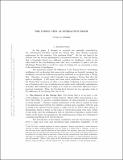The Turing test as interactive proof

View/
Author
Published Version
https://doi.org/10.1111/j.1468-0068.2007.00636.xMetadata
Show full item recordCitation
Stuart M. Shieber. The Turing test as interactive proof. Noûs, 41(4):686-713, December 2007. The definitive version is available at www.blackwell-synergy.com.Abstract
In 1950, Alan Turing proposed his eponymous test based on indistinguishability of verbal behavior as a replacement for the question "Can machines think?" Since then, two mutually contradictory but well-founded attitudes towards the Turing Test have arisen in the philosophical literature. On the one hand is the attitude that has become philosophical conventional wisdom, viz., that the Turing Test is hopelessly flawed as a sufficient condition for intelligence, while on the other hand is the overwhelming sense that were a machine to pass a real live full-fledged Turing Test, it would be a sign of nothing but our orneriness to deny it the attribution of intelligence. The arguments against the sufficiency of the Turing Test for determining intelligence rely on showing that some extra conditions are logically necessary for intelligence beyond the behavioral properties exhibited by an agent under a Turing Test. Therefore, it cannot follow logically from passing a Turing Test that the agent is intelligent. I argue that these extra conditions can be revealed by the Turing Test, so long as we allow a very slight weakening of the criterion from one of logical proof to one of statistical proof under weak realizability assumptions. The argument depends on the notion of interactive proof developed in theoretical computer science, along with some simple physical facts that constrain the information capacity of agents. Crucially, the weakening is so slight as to make no conceivable difference from a practical standpoint. Thus, the Gordian knot between the two opposing views of the sufficiency of the Turing Test can be cut.Terms of Use
This article is made available under the terms and conditions applicable to Other Posted Material, as set forth at http://nrs.harvard.edu/urn-3:HUL.InstRepos:dash.current.terms-of-use#LAACitable link to this page
http://nrs.harvard.edu/urn-3:HUL.InstRepos:2027203
Collections
- FAS Scholarly Articles [14537]
Contact administrator regarding this item (to report mistakes or request changes)


